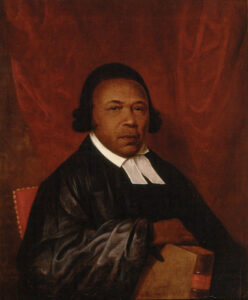
Absalom Jones
On February 13th, the church asks us to remember and give thanks for the life and testimony of The Reverend Absalom Jones. If you are like me, you likely do not know much, if anything, about Rev. Jones. Therefore, to give thanks to God for his life and faith, we need to learn more about this incredible man of faith.

Absalom Jones – Raphaelle Peale, 1810.
Delaware Art Museum. Public Domain.
Revd. Jones was born in Sussex, Delaware 1746. He was born into a life of slavery along with his mother and siblings. As a child, he was prescribed outdoor, hard labor. However, at an early childhood age, he proved to be an intelligent and gifted child. His enslaver, Abraham Wynkoop, had Jones educated and transferred as a house slave.
At an early age, Rev. Jones purchased a Bible and began to read it daily. One of Jones’s favorite biblical quotations was Galatians 5.1: “For freedom Christ has set us free. Stand firm, therefore, and do not submit again to a yoke of slavery.” The Bible’s emphasis on God’s redemption and deliverance inspired him to hope for a future in which he and his fellow slaves were free and equal to the rest of society. This hope became the driving force behind his mission and ministry.
Eventually, Rev. Jones relocated with Abraham Wynkoop’s son, Benjamin Wynkoop, to Philadelphia. In Philadelphia, he married a fellow slave, Sarah King. In Pennsylvania, an enslaved person could obtain his or her freedom. Jones and Sarah worked diligently for years to pull together enough funds to buy their freedom. In 1784, both he and his wife were free.
Upon gaining their freedom, Rev. Jones and Sarah worshipped at the interracial Methodist church, St. George’s. There he served as a gifted lay preacher. Many said he had a supernatural ability to influence people through his preaching. Many white and black people started attending St. George’s to hear Jones preach. Unfortunately, racism was still part of the culture at St. George’s. Jones and other black parishioners were mistreated and had to leave the church because of the mistreatment.
After leaving the Methodist Church, Jones and his friend, Richard Allen, started The Free African Society. This missional society grew into The African Church. Eventually, Rev. Jones was received as clergy into The Episcopal Church. His congregation was brought into the diocese and renamed St. Thomas’ Church. His ordination into The Episcopal Church marked the first ordination of an African American into The Episcopal Church.
St. Thomas’ became an influential force for the Gospel. Rev. Jones used the pulpit to proclaim the truth of Christ and the deliverance Jesus offers everyone. His congregation was a missional society that aimed to help the needs of both black and white Americans. However, Rev. Jones is most noted for his mild manner and pastoral nature. He believed in standing firm in Truth and love.
I will end with a quote from his most famous sermon, A Thanksgiving Sermon.
“Let the history of the sufferings of our brethren, and of their deliverance, descend by this means to our children, to the remotest generations; and when they shall ask, in time to come, saying, What mean the lessons, the psalms, the prayers and the praises in the worship of this day? Let us answer them, by saying, the Lord, on the day of which this is the anniversary, abolished the trade which dragged your fathers from their native country, and sold them as bondmen.”
Fr. Chase
